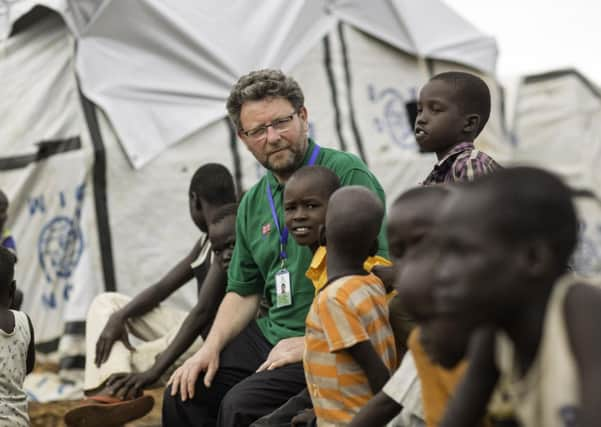Urgent need to help starving refugees in South Sudan


IAN Bray has recently returned from South Sudan where he paints a grim picture of life in the world’s newest country.
The 60 year-old Oxfam aid worker has been in Juba, the country’s capital, where aid agencies are working around the clock to provide relief to hundreds of thousands of people who have been forced to flee from violence.
Advertisement
Hide AdAdvertisement
Hide AdSince fighting broke out last December between government and rebel forces, at least 10,000 people have lost their lives. Following international pressure the two sides signed a peace deal in May, but the situation on the ground is increasingly desperate.
Around 4.9 million people need urgent humanitarian support, including 200,000 children suffering severe acute malnutrition, while seven million risk not having enough to eat in the months ahead unless international aid is dramatically increased.
Bray, who comes Armthorpe, near Doncaster, says the conditions are dreadful. “In Juba there are two camps for those who fled the violence. The camps are surrounded by razor wire and protected by UN peace keepers.
“People have been cooped up since December for their own safety and are afraid of leaving the camp as they will be attacked. They live tightly packed together under plastic sheeting in make shift tents”.
Advertisement
Hide AdAdvertisement
Hide AdAs well helping distribute food, Oxfam is providing clean water for the people living in the camps amid soaring temperatures.
The charity has also organised a system of firewood vouchers inside the camps that allow women to buy charcoal from authorised charcoal sellers.
“One of the major threats to women is collecting firewood for cooking as they have to leave the camp and therefore become exposed to violence and rape.
“With the charcoal vouchers they can cook for their families without putting themselves at risk”.
Advertisement
Hide AdAdvertisement
Hide AdDuring his time in South Sudan, as well as the camps, Bray visited Melut, in the north of the country, where thousands of people had fled from the bloodshed.
“People had little in the way of food and many told us that they had been reduced to eating leaves from trees. I met elders of villages that had been evacuated due to the fighting. Many said they had lost family members along the way.
“It was tragic to see these elderly, dignified people who were respected by their community knowing that they will probably never return to their homes and die in the camps.”
The crisis in South Sudan is back in the news today after a group of seven major international aid agencies, including Oxfam, World Vision and Christian Aid, said they face a shortfall of £52m.
Advertisement
Hide AdAdvertisement
Hide AdSpeaking out on the third anniversary of the country’s independence they warned their aid efforts were under threat due to a lack of funds.
South Sudan is regarded as the most pressing humanitarian crisis in Africa, with round 1.5 million people having been forced to flee their homes, many of them weak and malnourished.
Bray warns the situation is increasingly perilous and is calling on the international community to take further action.
“We will be staring into the abyss and fail to avert a famine if funds do not start arriving soon. This is a not a crisis caused by drought or flood. It is a political crisis turned violent.
Advertisement
Hide AdAdvertisement
Hide Ad“The people of South Sudan can only put their lives back together once the fighting ends,” he says.
“In the meantime civilians caught up in this crisis not of their making need our help. We are asking the public to help us with our urgent humanitarian work, but mainly we are calling on governments to fund the aid effort before it is too late.”